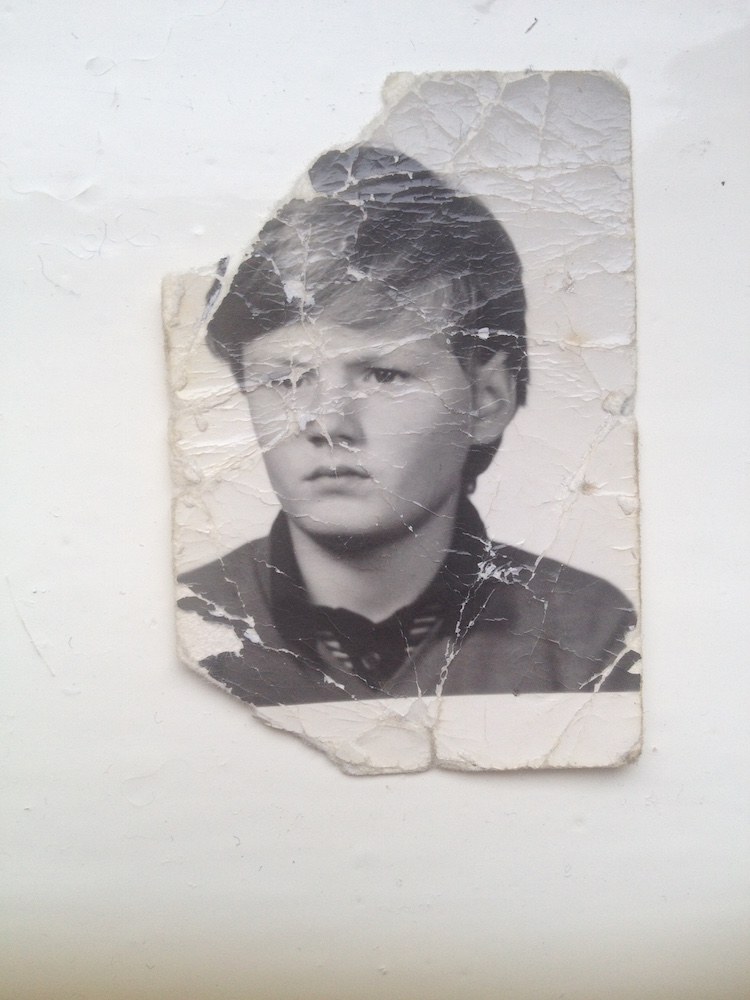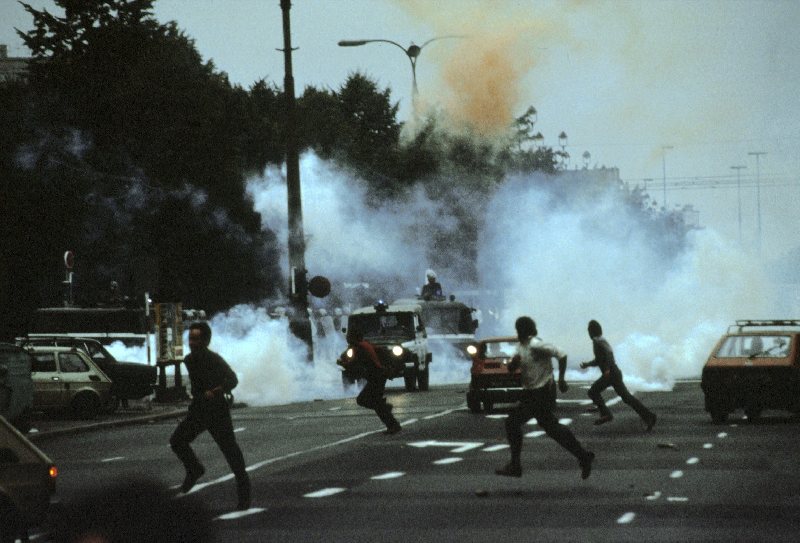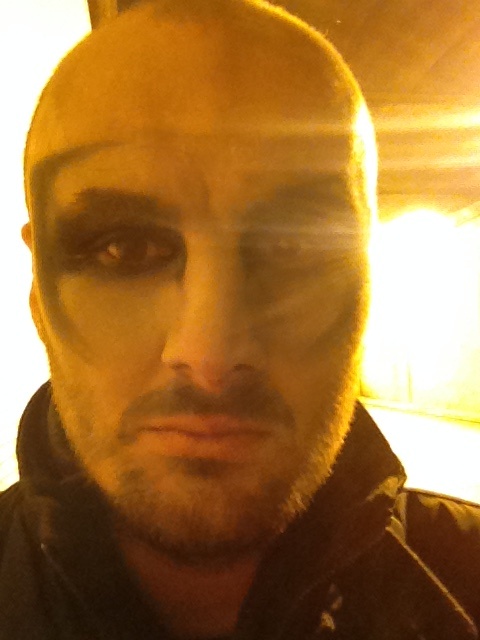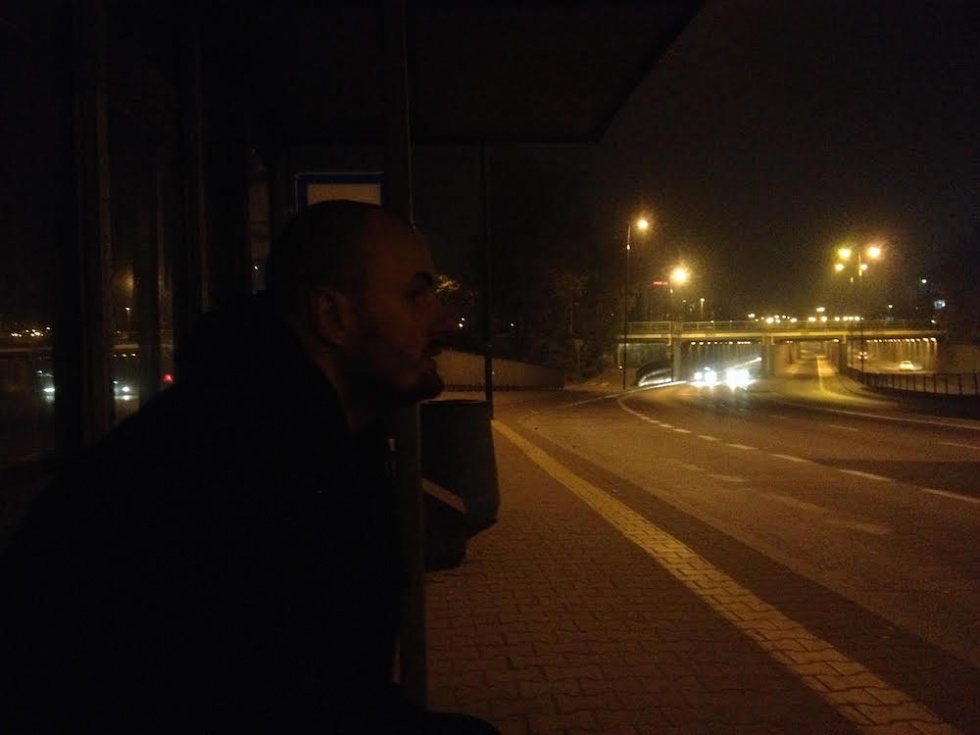Our recent trip to Poland was one of our most fascinating windows into underground culture yet. As it was part of the Stay True series of journeys we’re undertaking with Ballantine’s Scotch Whisky, we were on the look out for inspiration that spans generations, but we couldn’t have predicted how strongly that inspiration is felt.
As you can see in our film, we met three pioneers of Polish electronic music who made their names in the days when the Warsaw Pact held the whole of Eastern Europe under Communist rule – and also a younger generation whom they directly and indirectly influenced.
During our research, though, we found others still who were taking the highly distinctive spirit of electronic exploration in other directions still. Our film focuses entirely on those living and working in Poland, but as a counterpoint to it, we present here a deep interview with Peter “Echoplex” Sliwinski.
He represents a bridging of the generations – having grown up in Communist-era Poland, listening to the music of the original pioneers in our film – but as soon as the borders opened up, he took himself around the world, riding a wave of techno music, and participating in some of the most vital scenes of the 1990s and 2000s. Now Glasgow-resident, but soon to release an album on Berlin mainstay Marcel Fengler‘s IMF imprint, he is a true musical world citizen, so who better to provide a broader context for the material in our Stay True documentary?
JOE MUGGS: How do you introduce yourself if someone asks what you do?
PETER ECHOPLEX: My nickname is Echoplex, and it’s not a coincidence. This name fits very well to the music I make and how I perform this music on stage. There is a lot of echo in my sound: I love delays, space and hypnotic state of mind. I’m a producer and DJ of Detroit-style techno. I’m passionate about analogue sounds and beats.
There is many contradictions in what I have produced, lots of confusion between dub, minimal, techno, house, experimental, electronic – as if for many years I was searching and experimenting to find the sound that come from my inside. More recently I want to take my ego and soul and make something completely different with it. Express more consciously what I am at the moment through music.

Can you remember the first time you heard electronic music?
Probably just as born, in the hospital, I heard the bleeps! The heartbeat, the pulse, all the machines [laughs] Seriously though, the first time I heard electronic music was on a record by Marek Bilinski: E≠mc² on the Polton label in 1984. This record sounded like a video game music to me. I was playing on an old Atari computer at that time, loading the games through cassettes, and suddenly heard the same sounds coming off the vinyl surface, that was very interesting experience.
Later on, I discovered electronic music through the soundtracks and sound effects of the classic epic space operas and sci-fi: 2001: A Space Odyssey, Tron and Star Wars. I especially loved the R2D2 sound, which I later learned has been made by the famous sound designer Ben Burtt, who combined his own voice with the electronic sound played on the keyboard of the ARP 2600 synthesizer.
“They had not much access to the international fashion, so they tried to make their own things in the way that felt right”
Tell us a bit about childhood in Poland – were you aware of growing up under a repressive government?
I remember images, flashbacks, snippets of dialogues and the feeling of pressure. At first we lived in a small town of Podkowa Lesna, outside of Warsaw, so my father used to commute to work every day by train. When he came back each day it was a relief, because of the things that were going on the streets of Warsaw, the terror and the fear. Even though my family was not protesting or striking on the streets, we all felt that negative energy. I knew that there was an army, tanks and people killed on the streets.
People couldn’t leave homes at evening, as there was a special police hour. We couldn’t travel abroad as the airports and borders were locked. There was nothing available in the shops. Even my school was closed at that time. My parents would listen to a special radio programme broadcast from abroad – Radio Free Europe / Radio Liberty – where we heard the news of what is happening really in the country. These repressions have lasted until 1989. I was aware of what was happening to some extent, yet it took many years to understand what really happened, the nature of the regime and why all this repression took place.
How would you describe Polish music culture when you were young?
Polish music culture was very vibrant at that time. There was this feeling of being alternative. People were very open and they sought difference. They had not much access to the international fashion, so they tried to make their own things in the way that felt right to them. The culture was built through the radio stations, TROJKA, Polish radio. Shows like Studio Nagrań, Klasycy Syntezatorów, Top Tlen, or Studio el-Muzyki, the radio brought the sounds from the outside and inside. Those were the core influences that have cemented the culture.
It’s amazing, actually, how that radio culture still exists in Poland. Is carried over the generations. Radio was also a fundamental source of finding information about great music out there. You couldn’t go to a music store and choose any record, you could listen to the radio station, hear the song, find out the name, artist and then ask friends around to make you a copy on a cassette.
I used to go to a local bazaar with my father, there was one particularly huge all around an old swimming pool and sports club called Skra in Warsaw. This was the place where you could get a Bravo (yeah you Limahl fans know what I’m talking about, right?) or get Thriller on vinyl. My father would buy a lot of records there, so at home we listened to Marek Bilinski, Republika, Obywatel GC, Manaam, Lady Punk, Konrad Kucz, Artur Lason, Slawomir Losowski or Czeslaw Niemen. It was a tough reality, however this music and radio culture was allowing people to do amazing things using just what they had access to.
Looking back now, do you think there is anything specifically Polish about the music of the older composers in our film?
Yes, it’s all about the rebel inside of them. ‘Cause of being in the system, not being able to discuss their feelings and share their beliefs openly, they all expressed themselves – through sounds. Some people chosen to go into the streets, scream, protest or set up a stand-up comedy and make fun of the system, while others take the negative energy from the current state of affairs and transmit into the sounds through electronic means. As synthesizers were allowing you to experiment freely, those were the weapons for artists.
“I think the fall of Communism in Poland followed by the collapse of the Berlin wall in 1989 was a trigger point to the explosion of techno”
The artists in the film share one powerful message: electronic music was their language that was beyond the understanding of the regime. It was their Enigma encryption. It’s very interesting how bands created songs with a hidden meaning or message, making songs about what seemed on the surface trivial things, while in their depths they passed very strong emotional messages that carried over people through the communist regime, and gave them hope and strength.
You left your home country around the time of the end of the Iron Curtain, which was also the time techno and other electronic music was exploding globally. Can you describe the feeling of the time? Did the two things feel connected?
The feeling of the Iron Curtain falling down had brought in the feeling of freedom for many, and techno and other electronic music coming right at this moment with the explosion of the rave scene gave people a way to freely express themselves. It was the sound of that time. The rave, the craziness without limits. I think the fall of Communism in Poland followed by the collapse of the Berlin wall in 1989 was a trigger point to the explosion of techno in Europe. I personally would say that those two things feel very well connected, yes. [laughs]
You moved around to various places after that – can you say something about the music cultures you plugged into in the different places you lived?
I lived in Italy for some time – that’s where I really had a chance to experience the break-out of the rave scene. In fact, I learnt the Italian culture through techno! As a teenager it was my first ever DJ residency in Ladispoli. It was all about fun, going to the beach: less serious, more of a party. It had a lot to do with the Italian people, and their mentality of being a very outgoing nation.
Another important music culture I plugged into was while living in Windsor, Ontario, Canada. I was a frequent visitor to The Music Institute over the border in Detroit, right at the break-out of the Detroit Techno, and I experienced this wave in media and radio as well as in clubs. It was really fascinating how alternative techno beats easily got into mainstream media. I remember these two TV shows that were a trademark of those times: The New Dance Show in Detroit and Electric Circus in Toronto. I went there couple times and was part of it. It was like the Boiler Room of the early 90’s, but the focus was not on the DJ, it was all about the people and the raving.
When I moved to the west coast of Canada, I found myself in quite an international mix environment, which was music-wise influenced by other countries, without a signature national sound. Vancouver being the west coast, I was very heavily influenced by the San Francisco and Bay Area electronic sound of people like Jonah Sharpe aka Spacetime Continuum. That’s where I started making my own first sound experiments in a school studio of electronic music composition class at Port Moody High School, and eventually releasing – as Les Autres Circuites, first, then as Echoplex.
All those culture plug-ins collectively are what make up my experience and so make up the sound of Echoplex. I believe that all those places I lived in drop a very significant influence into the music that I make now.
You have become part of a very global techno scene; do you feel you’ve retained a particularly Polish or Eastern European character in your music?
I feel that there is the struggle and hunger in my music. Lots of emotions and darkness for me all come from Poland and places like Warsaw that have a darker side of history being free from the Communist regime only for 25 years. I strongly feel that there is the Polish soul inside my music. It’s obviously not Frederyk Chopin – however there is the element of wildness and melancholy mixed.
Were you in touch with other musicians from the former Eastern Bloc over the years?
Even though I have moved to Scotland couple years back, I stay close to what is happening in Poland, and I maintain long-distance relationship with some friends in Poland. I have recently recorded a remix for a good friend of mine Piotr Klejment of Technosoul, who is the next generation of Polish Techno to come. I try to help people by sharing the experiences, knowledge both about the music, producing and international scene.
Some people talk about electronic instrumental music as a universal language – and definitely it can connect people, but by doing that does it wipe out cultural differences?
Techno is definitely the main way to express my inner universe, if that’s the way how you want to define “universal language”. This language lets me share real feelings whether happy or sad, feeling of achievement or failure, strength or fear. Techno, like any other means of expressive music, connects people, sure. But I believe there is also the element of folk, the inner taste in techno that we inherit from our cultural backgrounds, which is something that is very cool. We all come from different countries and it is reflected in our music.
I can receive a demo from Japan and hear that the music was made in Japan. Interestingly enough, when there, I made some music that I’m quite sure would have never made in a place like Poland or Australia. When in Berlin, I tune into the city and different sounds come out. Same with Scotland, even being in a different building suddenly, naturally the mood shifts and the music changes. When you travel you can experience all this cultural differences also in techno.
Our cultural differences are there with us through the life journey, some people identify with it and express, while the others deny and constantly battle their demons inside. I don’t believe this connection between people will cause our cultural differences to wipe out. Techno will allow us to maintain our own cultural identity and at the same time find the universal means of communicating with the outside world as I think it goes much deeper: its more mental and spiritual.
What do you think about how Polish underground music has developed in recent years?
What I’m noticing, and I’m happy about, is the sensation that we are now becoming a fully confident and proud people, reaching out to a wider audience. This used to be the problem. We used to have the complex of being worse. Promoters and organizers are realizing that there is substantial amount of local talent to be explored further and young generations of producers are getting chance to perform outside of Poland as well as release on international labels.
You’re about to release an album for the first time in your career – why has that taken so long?
Probably it’s a coincidence. I may have recorded a few albums so far as Echoplex but for some reasons thay are still sitting on my desktop. I got a request from Marcel Fengler to record an album for IMF, and I find this idea of creating a brand new album from start to finish very exciting. There have been many turbulances in my life and I guess I had to leave my musician’s ego to wait patiently for the right moment of the silence after a storm.
I have thought for a while about all my unreleased albums and projects I had in my hands and almost but never put out, and I want to believe that everything happened for a reason. I used to feel the need of being in the techno cyclone’s eye, but now I feel prepared and ready for it.
With seriously-crafted techno now more popular than it’s been since the 90s, how do you feel about it as an international scene?
I have never been fully aware if something was popular or not. It was more of a question whether I like it and it makes me feel something or I walk past it insensibly. When it comes to techno being as an international scene, then if more people enjoy techno and accept it as a genre of music, they will open themselves to listen to it. This will allow us to have opportunity to reach more people, touch more souls and that’s good enough for me.


